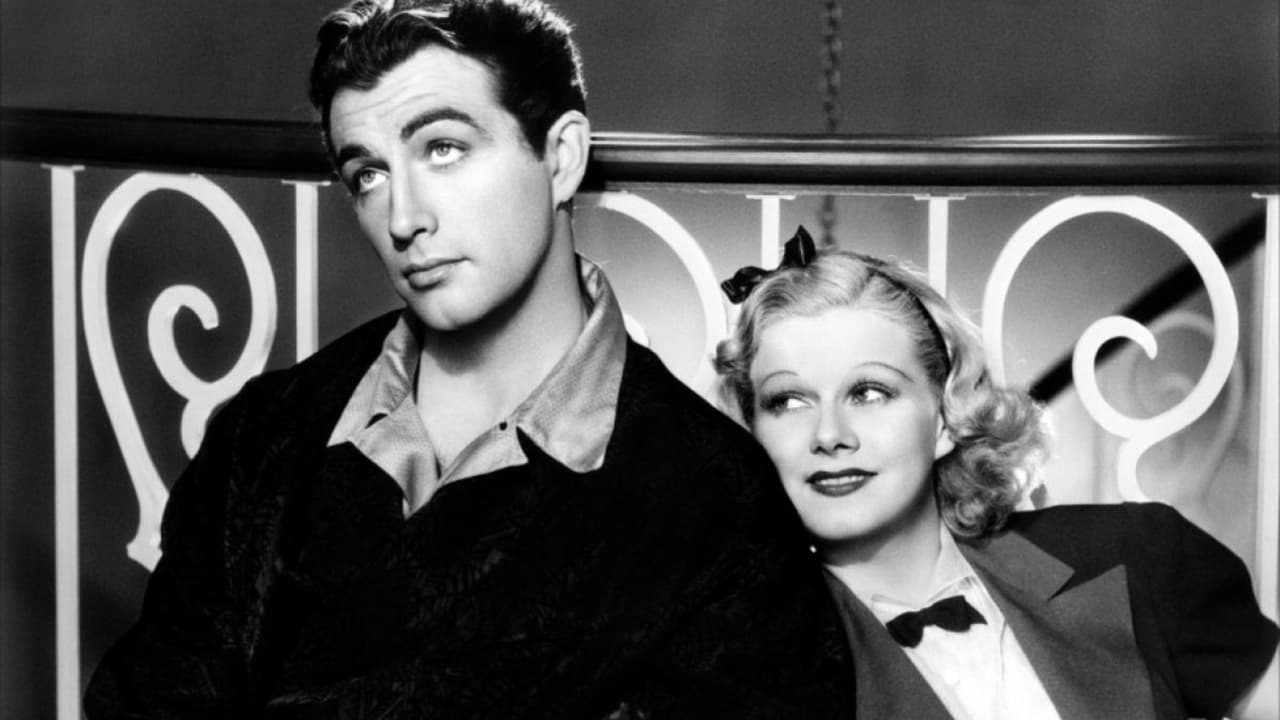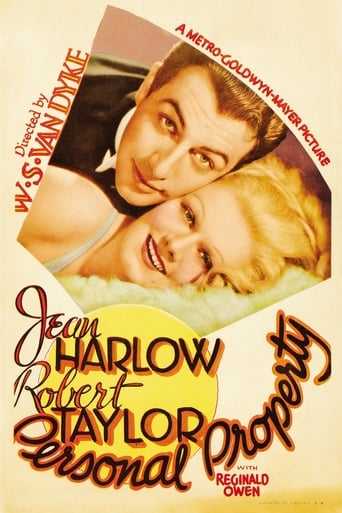



Most undeservingly overhyped movie of all time??
It’s an especially fun movie from a director and cast who are clearly having a good time allowing themselves to let loose.
View MoreThe first must-see film of the year.
There's no way I can possibly love it entirely but I just think its ridiculously bad, but enjoyable at the same time.
View MoreCopyright 15 March 1937 by Metro-Goldwyn-Mayer Corp. New York opening at the Capitol: 15 April 1937. U.S. release: 19 March 1937. 84 minutes. (An excellent DVD from Warner Archive).SYNOPSIS: The scene is England, and Miss Harlow is an American widow who is in financial straits. Taylor plays an irresponsible playboy of good family who gets into trouble for selling a car he didn't own and is disowned by his family, including father E. E. Clive and brother Reginald Owen, who consider him hopelessly and irredeemably shiftless. Taylor accepts a sheriff's offer to watch the house and furnishings of widow Harlow to make sure she moves nothing. COMMENT: High-grade upper-crust comedy, with the cast in fine form, under the expert direction of W.S. Van Dyke. Harlow is given several opportunities as a comic impersonator and acquits herself well. The accent is much more on her ability as a comedienne than on her physical charms, which, if anything, are under-emphasised - although cinematographer William Daniels does give her some attractive close-ups, he also treats us to an equal number of unflattering angles. Similarly, although she has a good wardrobe by Dolly Tree, she slops around for a good deal of footage in an unrevealing bathrobe. And Marla Shelton, at her first appearance wears a more gorgeous gown than any Harlow puts on. Also Harlow's brunette hair is not as alluring as her platinum blonde tresses were.Oddly, therefore, it is not Harlow but Robert Taylor who walks away with the film's acting honors. Harwood's play is a typical comedy of manners, its storyline slight but long on co-incidence, its chucklesome but one-joke plot fleshed out with a host of captivating and wonderfully quirky characters. Yet, though surrounded by such scene-stealing stalwarts as Reginald Owen as the blustering brother, E.E. Clive as his nervous nellie dad and Una O'Connor as a quarrelsome slavey (not to mention Forrester Harvey's punctilious bailiff, Billy Bevan's adroit waiter and Barnett Parker's unintelligible lounge lizard), Taylor is completely unfazed, delivering a professional performance that is at once suave, sophisticated, charming and wholly likable.Incidentally, Harwood's play was previously filmed by M-G-M in 1931 under its original title. Robert Montgomery had the Taylor role, whilst Irene Purcell enjoyed the Harlow innings and Charlotte Greenwood impersonated the cook-of-all-work. Cast in the same roles in both versions were Reginald Owen and Forrester Harvey. The 1931 picture was directed by Sam Wood from a screenplay by Sarah Y. Mason, with additional dialogue by P.G. Wodehouse.
View MorePERSONAL PROPERTY (Metro-Goldwyn-Mayer, 1937), directed by W.S.Van Dyke, stars Jean Harlow in one of her final screen performances before her untimely death later in the year. In her only comedy, in fact, only movie role opposite then rising leading man, Robert Taylor. It was also a remake of MGM's earlier carnation titled THE MAN OF POSSESSION (1931) starring Robert Montgomery and Irene Purcell in the Taylor and Harlow roles. While each have aired on Turner Classic Movies for comparison, both are forgotten comedies with the latter noteworthy only for the screen presence of Jean Harlow alone. Taylor plays Raymond Dabney, son of an accomplished British family. Having served a jail sentence for selling a car without having paid for it, and now released early for good behavior, Raymond, greeted by his loving mother (Henrietta Crosman), doesn't get the same reception from his serious minded brother, Claude (Reginald Owen), partners with his father (E.E. Clive) in women's underwear. With both men disowning him as part of the family, Raymond is offered 300 pounds to go far away as possible and start life anew, possibly in Canada or Australia, but he would rather remain in London instead. Later, while at a cocktail lounge, Raymond meets Crystal Wetherby (Jean Harlow), an American widow of a big game hunter. Impressed by her beauty, Raymond, after making a bad impression, follows her to the opera and seats himself beside her during a performance of "Aida." If that's not enough, Raymond follows her home after the performance. Through arrangements by Herbert Jenkins (Forrester Harvey), a bailiff working for the sheriff whose wife is in the hospital expecting a baby, Raymond gets his opportunity by taking his place and legally entering as well as staying in Crystal's mansion as a "man in possession," a custodian of her possessions until the debts of her personal property have been paid. Due to her upcoming dinner plans to entertain her fiancé and future in-laws, Raymond agrees to assist her by acting the role of Ferguson, her butler. All goes well until Raymond meets Crystal's guests, who turn out to be more than familiar faces from his questionable past.With the plot being centered more on Robert Taylor's character than Harlow's, both become equally balanced by the midway point. PERSONAL PROPERTY does has some funny scenes. While, Hugh Mills and Ernest Vadja, who scripted this story from the play by H.M. Harwood, make every effort by turning this into an honest effort of hilarious drawing room comedy, the final results are simply average, no more, no less. One truly funny moment occurs with the arrival of mumbling British bore (Barnett Parker) and his confused exchange with Taylor. This great scene was later clipped into a 1964 documentary, MGM'S BIG PARADE OF COMEDY, which indicates others have felt this a highlight as well. Very brief, but good. A pity there weren't enough great scenes like it to make up for some rather weak material. Another problem with PERSONAL PROPERTY is that Taylor acts and looks too American to play the part of a British family. Taylor's butler and Harlow's rich girl gimmick is an obvious attempt to bring forth another MY MAN GODFREY (1936) that served William Powell and Carole Lombard so well, though not on the same level. Cora Witherspoon, who previously enacted opposite Harlow in the hilarious LIBELED LADY (1936) as Mrs. Burns-Norvell, the gabby mother, assumes similar chores here, this time simply as Mrs. Burns, with Marla Shelton as her flirtatious daughter who has her eyes on the young "butler" (Taylor). Interesting to note the supporting players, consisting those of Una O'Connor (in the role as Harlow's maid); Forrester Harvey and E.E. Clive to be those in memorable support in the James Whale science fiction classic, THE INVISIBLE MAN (Universal, 1933). Even more interesting is both Reginald Owen and Forrester Harvey reprise their roles from the 1931 film. Other British character types as Billy Bevan and Lionel Brahm serve their brief parts well. Placed on home video in the 1990s, PERSONAL PROPERTY should make an impression on those curious about the careers of both Harlow and Taylor, or lesser known "screwball comedies" from this era. With better roles ahead for Taylor, especially his reported personal favorite being WATERLOO BRIDGE (1940), Harlow next project would be another comedy, SARATOGA, noteworthy mostly as the one she never lived to complete, though her remaining scenes were performed by a stand-in double. For PERSONAL PROPERTY, it's all Harlow. (**1/2)
View MoreWhat surprised me about PERSONAL PROPERTY is that Robert Taylor had such a good sense of humor that could have been used in more films of this type for him when he was starting out. Usually cast as a rather dour and stern looking type (and later, the heroic villain or bad guy with a gun), it's a pleasure to see him in this mild romantic comedy that passes the time pleasantly enough but is easily forgotten.Jean Harlow co-stars with Taylor in what would be her last completed role for MGM. She seems a bit sluggish with her comeback remarks and somehow seems lacking the zest she usually showed in her romantic comedies with William Powell or Clark Gable. But she and Taylor make a handsome couple.The silly story never quite comes off as convincing enough with a strange number of elements in the plotting that has Taylor pretending to be her butler while falling in love with her--although she seems to resist his charms from the start. While the predictable ending is never in doubt, it takes a bit of persuasion to believe his brother could be Reginald Owen.Summing up: The thin plot moves rather sluggishly despite the brief running time but there are a few chuckles to get out of the whole thing. All in all, it's undistinguished from any viewpoint and a not too subtle jab at the idle rich.
View MoreNever viewed this Jean Harlow film where she stars as a widow with the name, Crystal Wetherby and Robert Taylor, (Raymond Dabney). Robert Dabney just comes home to his family after being in prison for six months for breaking the law and his brother and father are not pleased to see him come back home. Robert's mother is the only one who is happy to see her son and she wants to protect her son. The Dabney Family deals with ladies underwear and the business is not doing very well and Robert's brother wants to marry Crystal Wetherby for her money in order to save his business and he does not want anyone to know he had a brother who went to prison. It just so happens that Crystal is also broke and owes a large sum of money and she is being hounded by the bill collectors. Raymond Dabney is hired by a sheriff to collect the funds owed him and requires that Raymond stay in Crystal's home until the debt is paid. Crystal decides to have Raymond pose as her butler, but does not realize that Raymond is a Dabney and his brother wants to marry her. There is plenty of comedy and Jean Harlow and Robert Taylor burn up the silver screen together.
View More